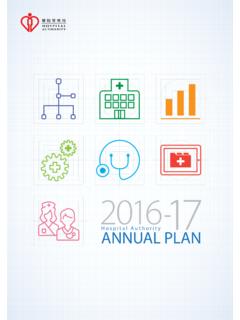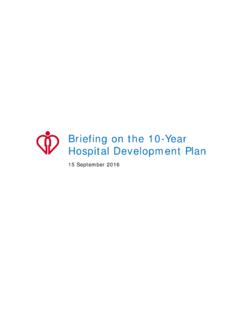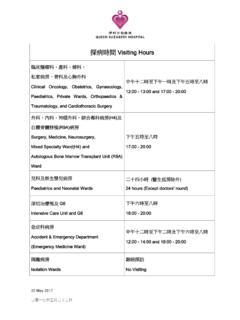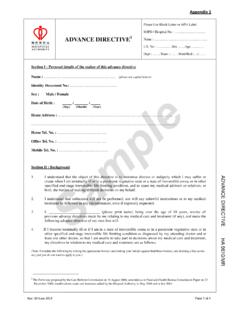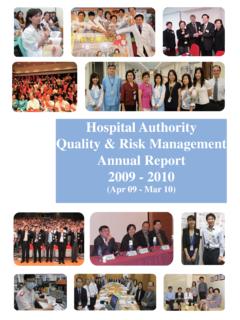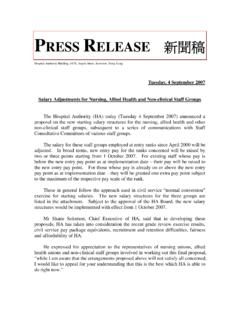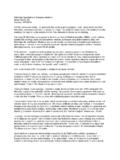Transcription of Resident Training Program in the Hospital Authority
1 Resident Training Program in the Hospital Authority (For 2018/19 Intake updated as at Dec 2017) TABLE OF CONTENT Background .. 1 Specialist Training programs of Various 1 Anaesthesiology .. 2 Clinical Oncology .. 2 Emergency Medicine .. 3 Family Medicine .. 4 Internal Medicine .. 5 Obstetrics and Gynaecology .. 5 Ophthalmology .. 6 Paediatrics .. 7 Pathology .. 8 Psychiatry .. 9 Radiology and Nuclear Medicine .. 9 Surgical Specialties .. 11 Program Directors .. 13 Contract Arrangements .. 14 Conversion to Permanent Employment .. 14 Appointment Procedures .. 15 Terms and Conditions of Employment .. 16 Lateral Transfer to Other Hospitals / Specialties * Notes.
2 16 Professional Registration and Annual Practising 17 Enquiries .. 17 Appendix I - Program Directors (PDs) in Various Clinical Specialties Appendix II Examinations / Training Levels to be attained for Continuation of the 9-Year Contract under the Resident Training Program Appendix III - Remuneration Package of Newly Recruited Resident Trainees Appendix IV - Criteria for Change of Specialty for Contract Medical Officers / Residents Undertaking Specialist Training - 1 - Background The practice of medicine in the Hospital Authority (HA) is organized on a specialty basis and requires the services of competent and qualified specialists.
3 The HA has to ensure that it is able to train sufficient specialists for the organization, while recognizing the need to meet the demand for specialists in the community. The Hong Kong Academy of Medicine (HKAM) has set out the specialist qualification examination requirements for the medical profession in Hong Kong. Most of the Resident positions in the HA are accredited as being able to provide the specialist trainee with the required Training and experience. The Resident Training Program in the HA has been drawn up to provide continuing postgraduate Training opportunities for medical graduates with respect to the needs of the community and the interests of the medical profession.
4 To achieve this end, the contract arrangements for specialist trainees are devised with a view to facilitating the completion of Training requirements set by the specialty college concerned, allowing reasonable time required for the majority of trainees to attain the specialist qualification and at the same time balancing against the chance of jeopardizing Training opportunities for new medical graduates. Specialist Training programs of Various Specialties Specialist Training programs of the various specialties are designed by the respective Colleges of the HKAM. The regular Training period is 6 years in general, divided into 2 to 4 years for basic Training and 2 to 4 years for higher Training after internship.
5 A brief introduction of the specialist Training Program of individual specialties is given below. Some specialties, Pathology, Radiology, Anaesthesiology, Emergency Medicine and Obstetrics & Gynaecology, etc. recognize and require their trainees to take up elective Training in other specialties. Period of elective Training is catered for during the Training contract. For details of the specialist Training Program structure and recognition of elective Training for each specialty, please visit the websites of the HKAM and the respective Colleges. Enquiries on the Training programs could be addressed to the HKAM and the respective Colleges direct.
6 Website : E-mail : Telephone : 2871 8888 - 2 - Anaesthesiology Training for the Fellowship of the Hong Kong College of Anaesthesiologists (HKCA) consists of a six-year rotational Program of modular Training after internship. The Program includes accredited anaesthesiology Training (forty eight months), intensive care (six months), elective options (fifteen months) and non-anaesthetic experience (three months). Other Training requirements include: satisfactory completion of the Exposure to Anaesthesia Safety and Emergency (EASE) course and the Effective Management of Anaesthetic Crisis (EMAC) course; keeping a logbook and satisfying the case number requirement as set out by the HKCA; and completing a Formal Project.
7 Trainees will also need to pass the Intermediate and Final Examinations, and satisfy the requirements of the Exit Assessment. Training Program for Intensive Care Medicine (ICM) Fellowship is also provided by HKCA. It consists of a six-year Program included accredited ICM Training (twenty four months), accredited anaesthesiology Training (twelve months), Internal Medicine or Paediatric Training (six months) and thirty months Training in specialties of acute medicine, such as Emergency Medicine, Surgery, Internal Medicine and ICM. ICM trainees are also required to pass the Intermediate and Final Examinations, satisfactory completion of a Formal Project, and satisfy the requirements of the Exit Assessment.
8 Selected trainees may undertake further Training for the Fellowship in Pain Medicine. More detailed information is available at the HKCA website Clinical Oncology All trainees need to be fully registered with Medical Council of Hong Kong (MCHK). Specialist Training in Clinical Oncology consists of 4 years of Basic Specialist Training including a minimum of 3 years of full time Training in an accredited Clinical Oncology Training centre, and a further 2 years of Higher Specialist Training . Post-registration clinical experience in another specialty can be considered as part of basic Training up to a maximum of 12 months, with the recognized duration at the discretion of the Hong Kong College of Radiologists (HKCR).
9 Trainees are required to enrol with the College on commencement of Training and to undertake structured Part I & Part II basic Training courses organized by the College. Part I Training courses include Medical Physics, Medical Statistics, Clinical Pharmacology, and Cancer Biology & Radiobiology. Upon completion of the Part I courses, trainees can take Part I Fellowship Examination (held by Royal College of Radiologists of UK in HK twice a year, in spring and autumn). Part II basic Training courses include management of cancers in various sites. Comprehensive clinical and practical Training in various aspects of oncology including radiotherapy, chemotherapy, hormonal therapy, biologic & targeted therapy, and palliative care will be provided.
10 Trainees are required - 3 - to satisfy a minimum attendance in the Training courses before being allowed to take the examinations and exit assessment. Upon completion of basic Training , trainees can undertake the Part IIA Fellowship Examination (held by Royal College of Radiologists twice a year, in spring and autumn) and then Joint Final Examination (Part IIB) (held jointly by Royal College of Radiologists and Hong Kong College of Radiologists yearly in autumn). Fellowship of Royal College of Radiologists will be conferred upon success in Joint Final Examination. Higher specialist Training is commenced after passing the Joint Final Examination.


